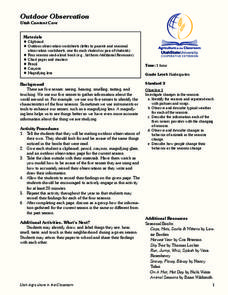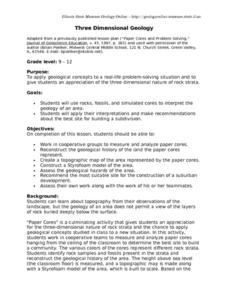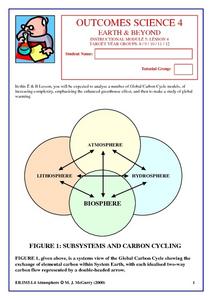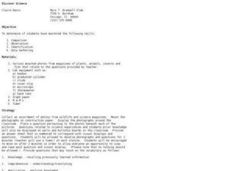Curated OER
Understanding Science Vocabulary And Categorization
Young scholars explore and examine scientific language and categorization as related to commonly known plants and animals. They hypothesize about a specific plant or animal, how it was scientifically named, what concepts and vocabulary...
Curated OER
Mutations--Preexisting or Acquired?
Students explore the reasoning and experimental approaches to mutations. They expose a culture of E. coli to virulent bacteriophage and observe whether mutations of the cells existed previously or if the bacteria mutated as a response...
Curated OER
Engineering and the Senses: Smell
Students define the sense of smell. In this smell sense lesson, students review their five senses and define the importance of smell. Students practice smelling and identifying items in bags. Students discuss the importance of smell to...
Curated OER
Thai Children's Trust: School for the Blind
Students explore their five senses by experimenting with classmates. In this blindness lesson, students utilize blindfolds while performing everyday activities and discuss the inherent challenges of not having vision. Students view a...
Curated OER
Outdoor Observation
Students use observation materials to record what they find outdoors. In this senses lesson plan, students use their five senses to observe things outside. They use a clipboard, pencil, crayons, magnifying glass, and their senses to find...
Curated OER
Heredity (Mendelian Genetics)
Students observe and record observations of whether a person is a taster or nontaster. They test selected individuals from their families and peer groups and chart all findings to determine which trait (e.g. taster or non-taster) is...
Curated OER
Where Do Birds Live? Cavity Nesters of the Watsonville Wetlands
Students compare and contrast primary and secondary cavity nesters. For this life science lesson, students explore the different types of nests that birds make. They play a team game to apply what they learned.
Curated OER
Nature's Recycling Program
Learners identify what materials make up compost. In this science of recycling lesson, students explain the benefits of composting determine how compost is a good plant fertilizer.
Curated OER
Pasta Bridges
Learners analyze the correct use of technology as it relates to math and science. In this science lesson, students investigate force and weight as it relates to building an object. They build a bridge and draw conclusion based on the...
Curated OER
The Curious Case of Mesosaurus
In this Mesosaurus worksheet, students read 2 short paragraphs about the distribution of the fossils found of this ancient reptile. Students answer 5 questions about Wegener's Theory of continental drift and how it possibly relates to...
Curated OER
Investigating Brass Instruments and Pitch
Students observe the sounds of different brass instruments in order to understand how to create different pitches. In this musical instructional activity, students create a "brass" instrument from everyday household objects. The students...
NASA
Decomposers Get Energy From Dead Things
When life gives you mold, make penicillin. Scholars design an inquiry experiment to determine what causes rotting and mold growth. It also covers decomposers and the important role they play for other living things.
Curated OER
The O Zone-Code Read Alert
What are the effects of an air quality alert? Expert groups receive one component of air quality information resources to study. Pupils then jigsaw into new groups and share their knowledge. Finally, they draft a statement of what they...
Virginia Department of Education
Prokaryotes
Lead your biology class on a cell-sized adventure! Emerging scientists construct models of prokaryotes, then design an experiment to properly grow a bacterial culture. They conclude the activity by viewing the culture under a microscope....
Virginia Department of Education
Charles’ Law
Searching for a relatively interesting way to demonstrate Charles' Law? Here is a lesson in which pupils heat air inside a flask and then cool the flask to quickly cool the air. They make observations about what occurs during the...
Curated OER
Three Dimensional Geology
Here is a fine lesson plan on geology designed for high schoolers. Learners use rocks, fossils, and other geological clues to determine the geology of an area. Then, they make recommendations to a fictitious city council about the...
Teach Engineering
Fairly Fundamental Facts About Forces and Structures
Don't twist and turn looking for a resource. The first installment of a six-part series teaches young engineers about the five fundamental forces of compression, tension, shear, bending, and torsion. These forces help explain different...
Curated OER
Germs and Your Body
Students study germs and ways your body fights against disease. For this germs lesson students complete an activity that demonstrates where germs can get into your body.
Curated OER
Saltwater Science
Students conduct an experiment that shows them how salt water allows things to float. In this salt water lesson plan, students mix ingredients together to create salt water and observe how it makes the oceans dense. They then interpret...
Curated OER
Science: Vocabulary Memory Game
Fourth graders increase their comprehension of science terms by playing a vocabulary matching game. In small groups, they take turns trying to match vocabulary terms with the correct definitions. Missed words are added to the students'...
Curated OER
Outcomes Science 4: Earth & Beyond
In this earth and beyond science worksheet, young scholars read through an 18 page packet containing information and questions pertaining to global carbon cycles. There are website links available on the pages where additional...
Curated OER
Discover Science
Students practice scientific research skills. In this lesson plan about science, students gain experience with the following skills: comparison, observation, identification, and data gathering. Students will go from station to station...
Curated OER
My 5 Senses Book
Students create a 5 page My 5 Senses book. They type 1 sense on each page and select 4 corresponding pictures to go with the sense.
Curated OER
Wanted: The Infamous Five
Students name the five most common types of foodborne pathogens. They comprehend how bacteria can grow and spread. Students are taught healthy hygiene and food-safety habits. They discuss the crimes of the five most wanted foodborne...
Other popular searches
- 5 E Science
- 5 Minute Science Experiments
- 5 E Science Magnets
- 5 E Science Lessons
- 5 E Lesson Plans for Science
- 5 E Science Forces
- 5 E Lesson Plans Science
- 5 E Life Science
- Science 5 E Model
- 5 E Model Science
- 5 E for Science
- Science 5 E Model























